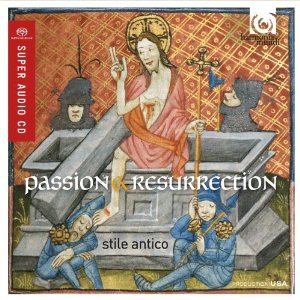The program concept—settings of texts inspired by the events of Holy Week and Easter—makes sense, but even if we weren’t aware of the liturgical and textual connections among these sacred motets by some of the most illustrious composers of the Renaissance, as listeners we would be immensely satisfied with the first-rate performances and uniformly gorgeous music. You could pick any one of these 13 pieces and justifiably label it a masterpiece, even though some of them are not especially well-known or oft-recorded. Stile Antico, a young British ensemble of 12 or 14 or 15 singers (it changes according to the work at hand), represents the future of serious, unhyped, technically polished, stylistically attuned, and musically affecting choral performance.
If you’re a frequent listener to Renaissance choral music, you have heard Victoria’s O vos omnes—but it’s unlikely that you’ve heard it sung so movingly, the very smallest phrases carefully shaped to capture the music’s textual meaning and emotional effect. The same is true of Tallis’ oft-performed O sacrum convivium and Guerrero’s correspondingly rare and remarkable motet Maria Magdalene. Equally rare—and musically compelling—is the opening work by William Cornysh, a substantial seven-and-a-half-minute setting of a 16th-century poem, Woefully arrayed, that showcases all of this choir’s sectional and ensemble strengths as well as introducing most of us to a memorable choral piece that, as far as I know, has only been recorded once before, by the Tallis Scholars. That performance, on a wonderful disc devoted entirely to Cornysh (itself an an act of supreme artistic conviction and courage against obvious commercial obstacles) employs single voices on each part, a viable alternative to this current version, only because the Tallis Scholars’ singers back in 1988 were without peer in this repertoire, and without technical flaw, whatever they sang.
Although the notes thankfully provide information about performing editions, we choir directors can only be disappointed to find that several of the program’s more enticing works are not commercially available—such gems as the opening Cornysh piece and the concluding Congratulamini mihi (Rejoice with me, all who love the Lord) by Flemish composer Thomas Crecquillon. This superbly crafted, resolutely joyous piece would be a hit on any serious choral music concert, if only it were published and available to interested choirs. (Incidentally, this same work appears on a 2006 Hyperion disc by the Brabant Ensemble, devoted entirely to Crecquillon; that earlier recording not only shares with Stile Antico the same performing edition of the motet, but also three of the female singers.) And speaking of hits, there’s no more worthy contender here than Flemish composer Jean Lhéritier’s Surrexit pastor bonus. This setting of the matins respond for Easter day, “the good shepherd has arisen…,” will not only be new to almost any of this disc’s listeners, but its captivating harmonic characteristics—not to mention its virtual celebration of the cross-relation—make this piece more than memorable, and eminently repeatable.
Perhaps not so eagerly repeatable is the program’s one contemporary work, John McCabe’s rendition of the “Woefully arrayed” text so compellingly set by William Cornysh in the disc’s opening number. Written for Stile Antico, McCabe’s setting exemplifies a certain trend in modern choral music, creating a sort of faux-atonal framework beset with hard-edged dissonance and rhythmic ambiguity that obscures the continuity of both music and poetry. It’s tough singing and consequently tough listening. Aside from this interesting if not entirely welcome diversion, this program and the first-rate performances should not be missed by anyone who loves Renaissance choral music. Stile Antico continues to honor the high standard set by its illustrious early-music predecessors, ensuring that its ongoing back-to-the-future projects will be both bright and beautiful. Highly recommended.
































